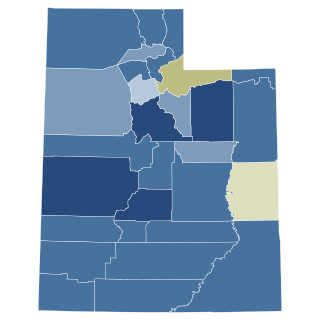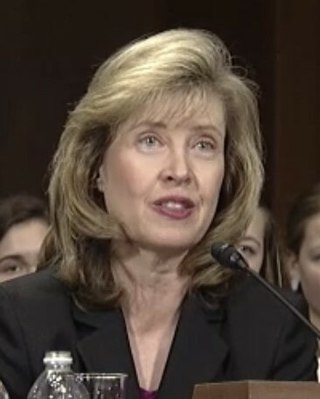Related Research Articles

Utah Constitutional Amendment 3 was an amendment to the Utah state constitution that sought to define marriage as a union exclusively between a man and woman. It passed in the November 2, 2004, election, as did similar amendments in ten other states.

Christine Meaders Durham is an American lawyer who served as a justice of the Utah Supreme Court from 1982 to 2017, including service as chief justice from 2002 to 2012.
Michael Roland Murphy is a Senior United States circuit judge of the United States Court of Appeals for the Tenth Circuit.
The Utah Court of Appeals is the intermediate-level appellate court for the state of Utah. It began operations in 1987.
Robert K. Hilder was a Third Judicial District Court Judge in Utah. The Third District consists of Salt Lake, Summit, and Tooele counties. He was elected Summit County attorney and was sworn in on January 5, 2015. Prior to that he did extensive mediation and arbitration work.
Anders v. California, 386 U.S. 738 (1967), was a United States Supreme Court case in which a court-appointed attorney filed a motion to withdraw from the appeal of a criminal case because of his belief that any grounds for appeal were frivolous.

Baker v. Wade 563 F.Supp 1121, rev'd 769 F.2nd 289 cert denied 478 US 1022 (1986) is a federal lawsuit challenging the legality of the sodomy law of the state of Texas. Plaintiff Donald Baker contended that the law violated his rights to privacy and equal protection. After a victory at trial, an appellate court reversed the lower court's decision and in the wake of its decision in Bowers v. Hardwick the Supreme Court of the United States refused to review it.
Matthew B. Durrant is the chief justice of the Utah Supreme Court. He is a graduate of both Brigham Young University and Harvard Law School. Durrant had a clerkship with Judge Monroe McKay of the United States Court of Appeals for the Tenth Circuit, a position as a lawyer for the Utah firm Parr, Brown, Gee, and Loveless for over a decade, and time spent on the bench of Utah's Third Judicial District.
Ronald E. Nehring was an American judge and attorney who was a justice of the Utah Supreme Court from 2003 until his retirement in 2015.
Paul Michael Warner is an American lawyer who served as a United States magistrate judge for the United States District Court for the District of Utah. He was appointed to this position on February 19, 2006. He retired in 2020.
Gregory Keith Orme is one of the seven judges serving on the Utah Court of Appeals.

Jill Annette Niederhauser Parrish is an American lawyer who serves as a United States district judge of the United States District Court for the District of Utah. She served as a justice of the Utah Supreme Court from 2003 to 2015.
Michele Mladejovsky Christiansen Forster is an American lawyer who has served as a judge of the Utah Court of Appeals.
Judge Bruce C. Lubeck is a district court judge in the U.S. state of Utah.
Julie V. Lund is a juvenile court judge for Utah's Third District Juvenile Court; she serves Salt Lake, Summit, and Tooele Counties. She was appointed to the position by Governor Gary Herbert on November 9, 2010 to replace Judge Sharon P. McCully, who retired in September of that year.
Joseph C. Fratto Jr. currently presides as a Utah Third Judicial District court judge for Salt Lake County. He was appointed to the bench in 1997 by Utah Governor Michael O. Leavitt.
Glenn K. Iwasaki is a Utah attorney. He served as State Court Judge for the Third Judicial District Court, which serves Salt Lake, Summit, and Tooele counties of Utah. He was appointed to the bench in July 1992 by Governor Norman H. Bangerter, and has served there since. He retired on September 30, 2011.
William A. Thorne Jr. is a judge on the Utah Court of Appeals.
Scott Daniels is an attorney who has been a prominent public figure in the state of Utah, having served as a Utah State Senator and a State judge.
Jill McKee Pohlman is an American lawyer from Utah who serves as a justice of the Utah Supreme Court. From 2016 to 2022, she was an associate presiding judge of the Utah Court of Appeals.
References
- 1 2 3 4 5 6 "Judges' Biographies". Utah Courts. Archived from the original on 2018-02-06.
- 1 2 "Unknown". www.facebook.com. Archived from the original on December 12, 1998.
- 1 2 "Frederic (Ric) M. Oddone". Judgepedia. 2010-12-06. Retrieved 2011-10-15.
- ↑ "Utah Voter Information Pamphlet" (PDF). Archived from the original (PDF) on 2011-07-21. Retrieved 2011-03-15.
- ↑ "State of Utah in the interest of A.C.C". Utcourts.gov. Retrieved 2011-10-15.
- ↑ "Judge closer to taking away 11 kids from Kingston wife". Deseret News. 2005-01-07. Archived from the original on October 22, 2012. Retrieved 2011-10-15.
- 1 2 "M.N. v. State (In re B.N.)". Utcourts.gov. 2005-03-24. Retrieved 2011-10-15.
- ↑ Unknown [ permanent dead link ]
- ↑ "The Washington Post - Huntsman Center Awash in Lore - University of Utah News Release: March 18th, 2006". Unews.utah.edu. Retrieved 2011-10-15.
- ↑ Our History. "Our History | Children's House International Adoptions". Childrenshouseinternational.com. Archived from the original on 2011-09-14. Retrieved 2011-10-15.